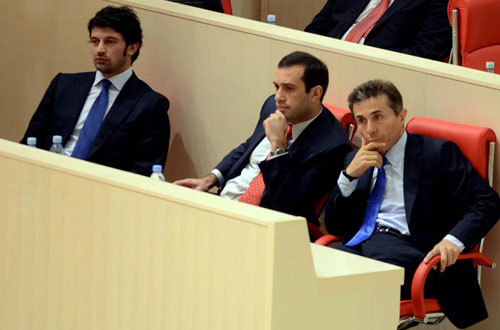
New Georgian Ruling Regime Attempts to Shed Allies and Consolidate Power
Publication: Eurasia Daily Monitor Volume: 10 Issue: 28
By:

On February 5, Georgian Prime Minister Bidzina Ivanishvili made a number of statements addressed to Defense Minister Irakli Alasania, some of which sounded like accusations and warnings against the leader of the Our Georgia-Free Democrats (OGFD) party and one of the leaders of the ruling “Georgian Dream” (GD) coalition. Ivanishvili first said that Alasania, who apparently hoped to secure the GD nomination to run for president in October 2013, would not be a “role model for the presidency.” The prime minister elaborated that if anyone, including Alasania, wanted to campaign during the presidential election without consulting the GD coalition, he could do whatever he liked, but he had to leave the coalition and run independently (www.versia.ge, February 6). It was a clear and direct message to Alasania that either he needs to drop his presidential ambitions or leave the coalition and run independently in October, presumably to then be defeated anyway by the GD candidate.
Ivanishvili also expressed his dissatisfaction that the GD coalition did not secure satisfactory election results in those seven districts in western Georgia’s Samegrelo region, which Alasania concentrated on during his parliamentary election campaign in October 2012 (www.pirweli.com.ge, February 5).
Earlier, parliamentary vice speaker and high-ranking GD member David Saganelidze declared that Alasania’s OGFD party was infiltrated by President Mikheil Saakashvili’s United National Movement (UNM) members to destabilize the coalition. He called on the OGFD to expel some of its members. Otherwise, he said, he would conclude that the OGFD was behind the intra-coalition conflicts (www.interpressnews.ge, January 31). Ivanishvili quickly seized on this statement, sharing Saganelidze’s suspicion that the UNM did indeed plant its members in the OGFD to provoke instability (Rustavi 2, February 1).
All these statements added insult to the injury Alasania suffered earlier this year by being ousted from the post of deputy prime minister by Ivanishvili on January 23. Ivanishvili had explained Alasania’s dismissal by the latter’s “little mistake” of discussing his presidential prospects for October 2013 (Imedi TV, January 23).
Following this string of public humiliations, it was widely expected that Alasania would resign and that his OGFD party would leave the GD coalition and move into the opposition. However, Alasania has stayed on. Many blamed his very personal character for remaining within the GD coalition. He is widely perceived in Georgian political circles as ambitious—albeit a weak and indecisive politician.
Apparently, Alasania, after spending almost four long years in the opposition, is not ready to give up his government post. Moreover, Alasania senses that his move into the opposition now—while the National Democratic Institute’s (NDI) recent poll finds GD public support standing at 65 percent and that of Ivanishvili at 80 percent (www.civil.ge, December 12, 2012)—may cause him to spend some time alone in the political wilderness. He cannot re-ally himself with the president’s UNM, under which government he served in 2004–2008. Mutual animosity continues to run deep. UNM Secretary General Vano Merabishvili recently called Alasania “an ordinary coward” (www.iveroni.com.ge, www.info9.ge, February 1), while President Saakashvili said that he does not like Alasania as a politician, also expressing his dissatisfaction over the fact that Alasania is being “sprinkled on his head”—Georgian slang for being badly humiliated—everyday (www.netgazeti.ge, February 8). Most probably, Alasania will wait until things politically turn sour for the GD and then will move into the opposition on some pretext of a political disagreement with the coalition.
Whatever Alasania’s plans are, it is clear that Ivanishvili has begun to consolidate the new regime’s power. He apparently is trying to push Alasania out of the coalition, although the prime minister denies any rift within the GD (www.tspress.ge, February 5). By trying to dump Alasania, Ivanishvili first and foremost attempts to rid himself of a potential competitor to his own presidential candidate favorite, Vakhtang Khmaladze, who is regarded by some observers to be a political lightweight. Second, by publicly humiliating Alasania, Ivanishvili sent a clear message inside the coalition that no independent action would be tolerated. Third, as Ivanishvili’s government acts increasingly pro-Russian, he fears that Alasania may become an obstacle by playing a pro-Western politician. And indeed, Alasania does style himself as favoring closer ties with Europe and the United States. However, his pro-Western credentials are widely questioned in Georgian political circles, not least for joining the GD coalition and then its government, whose policies and political orientation are increasingly pro-Moscow. Nevertheless, Alasania may still use the issue of Georgia’s foreign policy orientation as his rallying point. Ivanishvili is apparently aware of this and is attempting to dump him now rather than later, when breaking away from the GD may provide Alasania with positive political dividends.
The new regime is pressing on other directions as well to consolidate its power. The Georgian Dream majority in parliament is pushing hard for constitutional changes that will deprive the president of his powers to dismiss government and appoint a new one without the legislative body’s consent. The new regime has felt under constant threat by this very issue since it came to power (www.civil.ge, December 28, 2012; February 5, 6). Also, the government has actively begun to solidify its electoral power base. Following the policy of economic populism, the government lowered the monthly utility price on electricity by approximately 25 percent as of January 2013 (www.opinion.ge, December 25, 2012). Additionally, the government significantly raised salaries for public employees in various sectors and handed out generous New Year’s bonuses as well.
All of these developments indicate that Ivanishvili’s government has started to shed unnecessary allies and tries to build its power by other means as well. So far, the ruling coalition retains quite a strong position in the political sphere, enjoying wide popular support. Whether the new regime’s efforts to consolidate power will slowly turn into a new round of semi-authoritarian rule for Georgia is yet to be seen. But such a threat always accompanies the consolidation of power.




